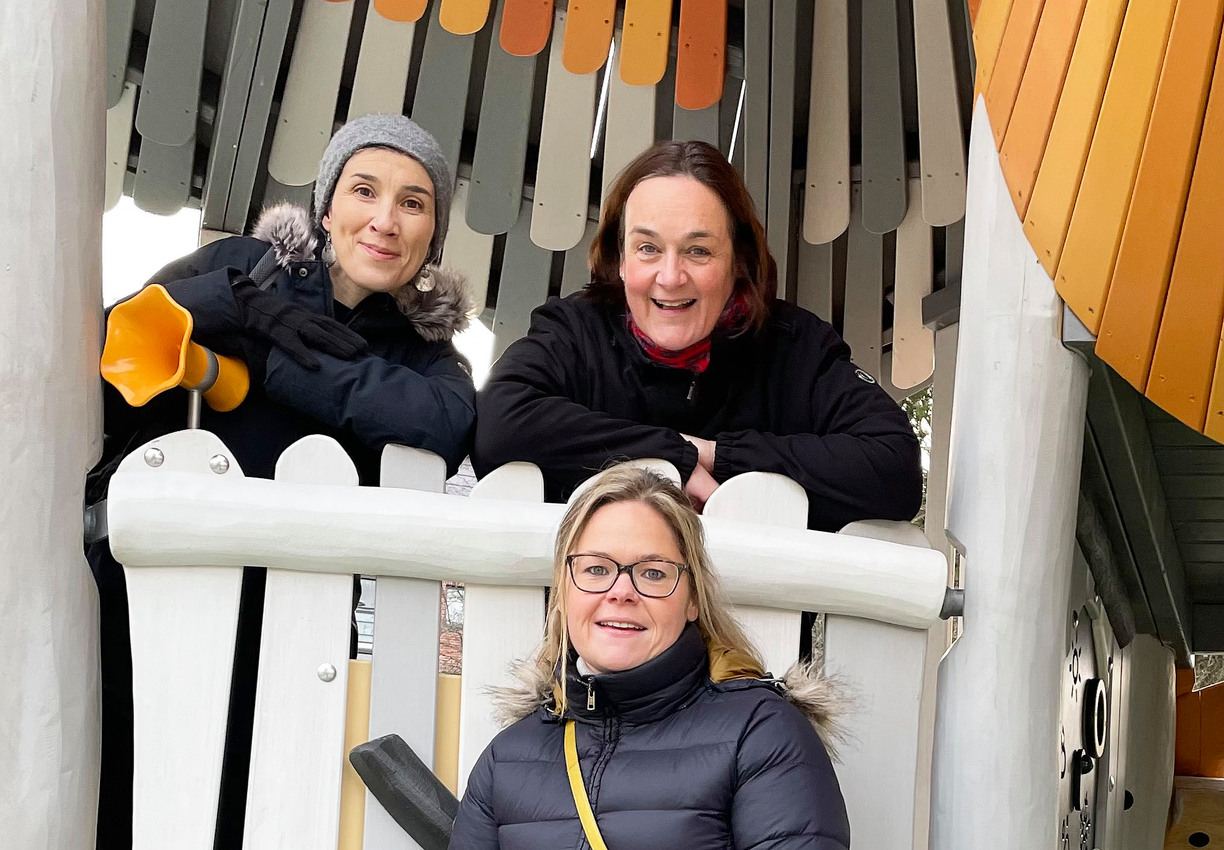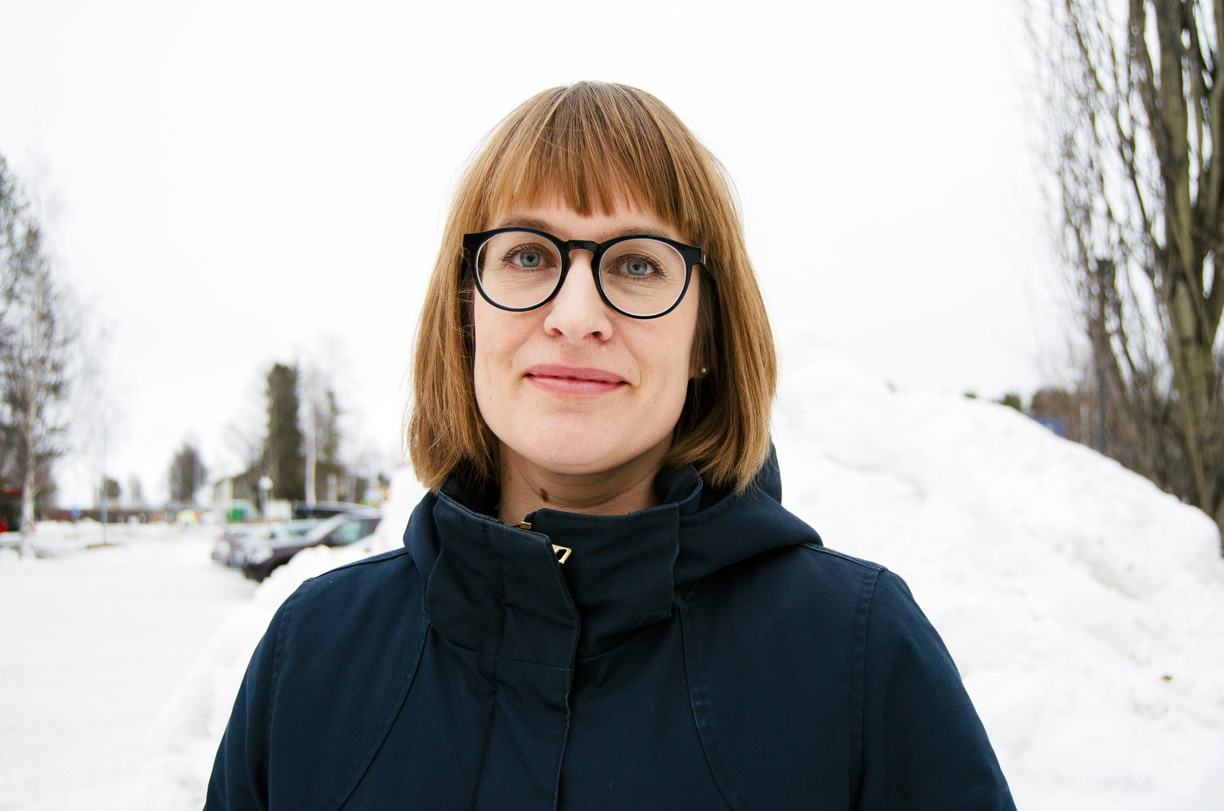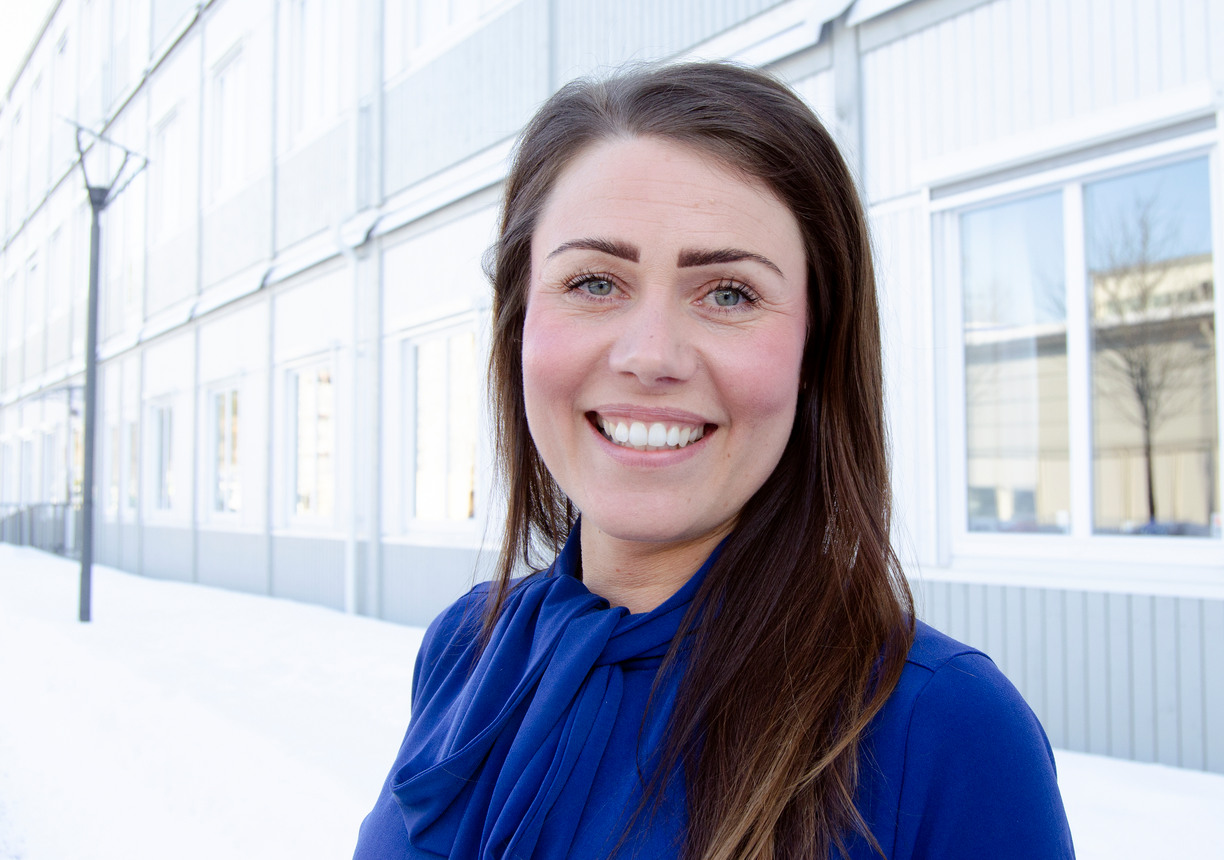Meet a doctoral student on Occupational therapy

International doctoral students: “It's nice that the children play outside despite the cold”
In an international project that studies children’s occupation of play, an exchange takes place between different universities. For a period, four committed doctoral students are studying at Luleå University of Technology. Two of them are living in Luleå for a year.
“We appreciate that the playgrounds in the schoolyards are open even outside school hours”, they say.
The project P4Play, researching play and play deprivation within 4 strands: People, Place, Policy and Practice, includes eight doctoral students and four different universities in four different countries. Some of them are currently at Luleå University of Technology. Michelle Bergin, is from Ireland and is a doctoral student at LTU and stayed in Luleå for one year of the project. She is co-hosted by University College Cork, Ireland. Fiona Loudoun comes from the same university, is from Scotland and is in Luleå for a short time as LTU co-host her PhD project.
Rianne Jansens is from Belgium and she is a doctoral student at University College Cork and at Luleå University of Technology, she has been studying and working here at LTU for one year. Ines Wenger who comes from Switzerland, and has been at Luleå University of Technology for several visits, but is not with us this day when we meet at the university. They will all receive doctorate in Occupational Therapy – Occupational Science collecting double degrees from two of the universities included in the collaboration.
“We investigate play in different dimensions, outdoor play at playgrounds as well as virtual play”, says Fiona Loudoun.
They like this way of working, they appreciate being in a group where all doctoral students are interested in the same subject and at the same time are able to build a network.
Cultural differences
Now, when they are in Sweden, they can note some cultural differences.
“The children in Sweden are out even if it is raining, snowing and cold. It is not that common where we live. In general, they are out a lot, they pick berries and are fishing. And the fact that the schoolyards' playgrounds are accessible is fantastic. In our countries, it`s high fences around them. Then there are a lot of playgrounds here, only here on Porsön are they so many”, Rianne Jansens says.
All three also state that even in Sweden, just like in their home countries, there is a lot to do to achieve greater accessibility to the playgrounds. There is not much for children with functional variations, who may have difficulty in moving, for example.
Nice atmosphere
They have also seen that searches on Google give completely different results compared to them at the other places. Having access to two universities’ libraries is great, as they are some differences in access to journals.
“This means that we can get more material”, says Michelle Bergin.
Fiona Loudoun thinks that there is a nice atmosphere at Luleå University of Technology and a nice community,.
“And the researchers are easily accessible. At the same time, many have been of great help to us, they understand that this it is also a challenge to move here. I have moved here with my family. And we are really enjoying our time living here”, says Michelle Bergin.
P4Play has four specializations. It is play as an activity, different places for play, people supporting play and to work with play in rehabilitation, and also how policies affect the possibility of play, for example guidelines from the state and municipalities.
The aim of the research is to develop new knowledge about play and play deprivation and at the same time investigate the effects of physical, socio-cultural and political influence on the possibilities for play. The aim is also to develop solutions to remedy what can prevent children from not being able to participate in play.
Maria explores social inclusion for the elderly

Maria Löfgren is a social worker who has moved on to research. She graduated from Umeå University in 2005. She then returned and earned a master's degree in 2018. Now she hopes to contribute to a deeper understanding of the social participation of older people, as it is important for their well-being. She also wants to explore how digital solutions can support the social participation of the elderly.
Hi Maria, what is your professional background?
“I have worked in various social services, both with the elderly and young people. I have also worked in public authorities, such as the Swedish Public Employment Service and the Swedish Social Insurance Agency.”
Why did you begin in research?
“When I was studying for my master's degree, I became interested in research studies. I saw an advertisement for a doctoral student for this project, which fits well with my areas of interest and previous work experience. I applied and got the opportunity to start here in the fall of 2019.
An aging population is a global challenge and the question is how we can meet the needs of older people to maintain a good quality of life.
There are political goals, for example within WHO, which focus on the well-being of older people, that they have the right to good health and an active life. There are health risks associated with involuntary loneliness and isolation. I am interested in that.”
What is your research about?
“Social inclusion, being able to be part of social contexts. Being able to maintain social contacts and belonging is important for promoting good health. For example, continuing with activities that you have previously done or various events that you participate in. I will study the needs of older people in order to maintain their social participation and how they deal with changes in their life situation in order to continue to be socially involved. I will also investigate whether or how digital solutions can support continued participation. It is also a gender equality issue that older people have access to and can handle digital tools. Previous research has shown that digital solutions have positive effects because they enable contact with friends and family.
I am planning four sub-studies, one of which is about how different societal actors and organizations see opportunities to support the social participation of older people. I hope to contribute to in-depth knowledge that can be useful in a broader perspective to support older people's quality of life and reduce experiences of loneliness and isolation.”
What is it like to be a researcher?
“I feel privileged to be able to immerse myself like this and eventually contribute to a wider context. And it's stimulating to learn something new, like now when I, as a social worker, can immerse myself in occupational therapy. It is both stimulating and challenging.”
Continued development of digital rehabilitation via 1177

Via a digital platform on 1177, people affected by stroke will be able to take part in a new rehabilitation program. Ida-Maria Barchéus, doctoral student in occupational therapy at Luleå University of Technology, is now investigating how occupational therapists and people with stroke experience it. “They test the digital rehabilitation together and I interview them, among other things”, she says.
Ida-Maria Barchéus is conducting her studies as part of the research project "Towards a more active life - easier and more equal access to rehabilitation via an integrated web program".
A web program has been developed and is now in the support and treatment platform in Vårdguiden 1177. It contains seven different modules. The person may take part in short films and carry out tasks via the web. It is combined with digital meetings with occupational therapists who provide support in the change work.
”Rehabilitation is very much based on self-reflection and developing strategies for the person to be able to have an active everyday life. The films are five to ten minutes and should inspire the person before the self-reflection tasks and conversations with the occupational therapist”, says Ida-Maria Barchéus.
Active life a goal
The aim is to develop rehabilitation for those affected by stroke and the goal is for people to be able to live an active life with a variety of activities in different places and together with others.
“I have contact with occupational therapists in the Norrbotten Region who recommend and ask people who can be included in the survey. Because we are in test mode, it is not open to everyone. For example, people must have the technology required and that they have mild to moderate consequences of stroke. The first study is complete and now I am doing three more in parallel”, says Ida-Maria Barchéus.
“I have investigated the feasibility of the digital approach and the content of the rehabilitation. I have done both interviews and follow the assessment form that the participants can fill out”.
More in-depth interviews
So far, it has been shown that when there are long distances, it can be good to be at home and avoid travel. Instead of spending time on travel, the people can instead engage in reflection and rehabilitation. Video meetings were experienced positively and better than telephone, because it is possible to see each other and reactions.
Two occupational therapists and four people with stroke were included in the first study.
“Based on the results, we have improved the content and support for the occupational therapists. Now we will test the feasibility with more participants. We follow the people's change process for twelve months and see how they adopt strategies for an active life”, says Ida-Maria Barchéus.
The results of the first sub-study must now be approved by a scientific journal and then published.
Further research is underway with more studies and the hope is that many people affected by stroke will want to participate. Ida-Maria Barchéus will now do more in-depth interviews with people who receive rehabilitation and their occupational therapists.
Updated:
Page author: Kontakta oss
